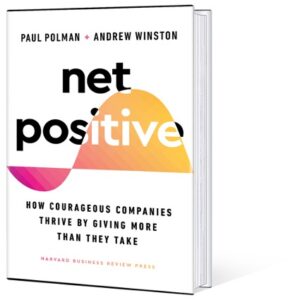[I wrote this before inauguration for MIT SMR. Most of the predictions have already happened, which wasn’t all that hard – they wrote down an 800-page plan of what they wanted to do…and they’re doing it. But it’s still critical for companies to do some thinking before acting rashly, which seems to be common right now.]
A new (or is it old?) administration is back in power in the U.S. After a four-year Biden administration, one that passed the largest climate bill in history (called, in Washington-speak, the Inflation Reduction Act, or IRA), the country has elected a president who has expressed hostility to sustainability — and within hours of being sworn in started acting on it. For corporate leaders, the changes will continue to be head spinning: The operating landscape for all things environmental and social is changing dramatically.
Here is how I see what might come next and how companies that want progress on sustainability should prepare and react.
Changes on the Horizon
Trump’s second term will resurface earlier policies and likely build on them, based on both his campaign promises and plans outlined in Project 2025. The list already includes deportations of undocumented immigrants; the slashing of many federal government programs; and anti-climate policies such as repealing and slowing clean economy initiatives (including a call for “no more windmills”). And, of course, tariffs — the new administration announced it will put in place 25% tariffs on products from Canada and Mexico and 10% tariffs on products from China beginning on Feb. 1.
First, let’s walk through likely top-line actions and outcomes regarding ESG.
On the environmental agenda, I expect, among other things, blanket support for fossil fuels (given the oil and gas advocates in senior roles throughout in the administration), a shift in incentives away from clean tech like the end of tax breaks for electric vehicles, high tariffs on Chinese parts going into clean tech, elimination of government reporting on climate impacts, and even the slashing of budgets for tracking the weather.
The social agenda will be volatile, with a drumbeat of threats of ever-larger mass deportations and aggressive anti-diversity rhetoric. Companies may feel intensified pressure to abandon ESG investing, stop marketing to LGBTQ+ customers, and generally drop DEI programs — retailer Target just scaled back its program, which the AP called a response to “a strong DEI opponent occupying the White House.”
Let’s extend governance beyond corporate oversight to governance writ large — that is, government and its governance of environmental and social issues. In practice, government or legislative support for environmental protection and the clean economy is at risk of vanishing at the national level, given talk of gutting the Environmental Protection Agency and repealing or counteracting the Inflation Reduction Act (IRA). Federal support for human rights, such as laws and Department of Justice actions to protect vulnerable people, is likely to be minimal.
In short, if you believe in the business and societal benefits of sustainability — action on climate to keep the planet livable, protection of air and water, reduction of inequality, racial and gender justice, and so on — the time ahead could be rough.
One important caveat: I’m outlining federal government actions. But federal inaction in the face of aggressive anti-sustainability efforts at the state level will have enormous consequences, too. Both opportunities for progress and unique pressures will arise in different states.
***Saying that tariffs may be a bad idea (or a good one) is not inherently pro- or anti-Trump***
Priorities for Companies in 2025 and Beyond
For sustainability advocates, this is all pretty dire, but there’s some reason for hope: Multinational companies can’t really stop their sustainability work. The U.S., while large, is not the world. For example, it’s only directly responsible for 13% of carbon emissions, in part because U.S. companies have outsourced a lot of production. And global megatrends like clean tech getting cheaper and society getting more diverse are unstoppable. Companies that want to stay relevant should not abandon action, but leaders will need to plan carefully.
Gather data. It’s important to understand what risks your business may be exposed to as well as where there could be some opportunities. Here are a few sample questions for your business and your value chain:
- Do we have a clear picture of our reliance on immigrant, and specifically undocumented, labor?
- What do the already-announced tariffs mean for our value chain cost structure? What if some tariffs on goods from China really are raised to 60% or even 100%? Or 10%+ on all imports?
- How much is our business affected by clean tech tax incentives and laws like the IRA?
- Do we know what our key stakeholders, especially our employees, value most and what they expect of us?
Run scenarios. I’ve spoken with executives who, when discussing the most extreme ideas of the new administration (like deporting millions of people), say, “Oh, they won’t do that.” But from a strategic and scenario-planning perspective, it seems unwise to wave away the extensive rhetoric. Consider what happens to your business if millions of people are taken out of some key labor pools. A few sectors could be deeply affected by deportations (food and agriculture, hospitality, construction) and other sectors hard hit by tariffs in general (electronics, apparel, toys). What will your business do?
Perhaps easier to imagine, since it’s already been happening, are attacks on the social agenda in business. What if the federal government tries to prosecute companies for DEI programs? Or there’s a social media campaign — supported by the Trump team in spirit and literally through retweets and other media — to threaten a boycott if you don’t reduce your DEI work and pull support from LGBTQ+ events like pride parades? And on the flip side, what might employees or customers feel if your business does retreat on diversity and inclusion?
On the climate side, given what’s increasingly happening on the ground, like tragic wildfires, storms, and floods, it’s long past time to make plans for parts of your supply chain being severely damaged. The new administration has been threatening to hold back recovery funds from California for the recent catastrophic fires. What if limited help comes to left-leaning areas that you operate in? Can you fill the gap?
Check your values. I’ve been critical at times of companies, under social media pressure and actual threats of physical violence, that pull back support for the gay community. But my point is not just that I feel strongly about human rights; it’s that the companies themselves have publicly made inclusion a core value. Leaders need to consider what their organization says it believes in and the ramifications of not living up to those values.
While a number of high-profile companies have publicly stepped back from DEI, the vast majority have said almost nothing, and a few, like Costco and Apple, have recently pushed back on social media pressure and shareholder resolutions. As Costco, long a leader in how it treats employees, said in a statement by its board of directors, “Our commitment to an enterprise rooted in respect and inclusion is appropriate and necessary … our success … has been built on service to our critical stakeholders: employees, members, and suppliers. Our efforts around diversity, equity, and inclusion follow our code of ethics.”
Costco is making an understated business case: that service to stakeholders is not philanthropy but business value creation.
Finally, beyond your company’s values, it’s important to personally consider your values and what really matters to you. Do you still feel like your company represents what you believe in?
Speak clearly about your beliefs. Companies need to make sure that their language and their assessments about impacts on their business are based in analysis, fact, and also values. All are OK. It’s become almost rote to say that the U.S. is bitterly divided. It’s true. But saying, for example, that tariffs may be a bad idea (or a good one) is not inherently pro- or anti-Trump. Statements of fact or opinion, and the running of scenarios, are not inherently political or partisan, and they’re smart strategy.
Keep moving. There are a lot of things about the sustainability agenda that are still very attractive. Why slow down on decarbonizing, switching to renewable energy, or electrifying your fleet when those actions have become radically cheaper? The fundamental drivers of sustainable business have grown only stronger. Action on climate change was not based primarily on response to stakeholder pressure or a progressive agenda. It’s a response to the reality of climate change and its impacts on businesses and humanity. Diversity makes business sense for many reasons, not the least of which is the fact that the world (and the U.S.) is getting more diverse. Younger employees and customers are living in a different place in terms of comfort with race, gender, and sexuality. Is your company able to hire and speak to Gen Z?
***Saying that tariffs may be a bad idea (or a good one) is not inherently pro- or anti-Trump***
Looking further down the road, could we see a golden age of sustainability with companies in the U.S. taking charge to keep the agenda moving? It doesn’t feel likely at times, with so many companies going quiet on ESG in 2024 (and so many giving in here in 2025). But these things can be hard to predict. And the voice of employees urging companies toward action could be stronger than we realize.
In the end, the new administration will create many dilemmas for companies that want to act on environmental and social issues. Will leaders have the courage to do what they believe is best for people, the planet, and their businesses over the long haul? I’m not sure, but I remain hopeful.
(Image: Pixabay, Dieterich01)
This article first appeared in MIT Sloan Management Review.


